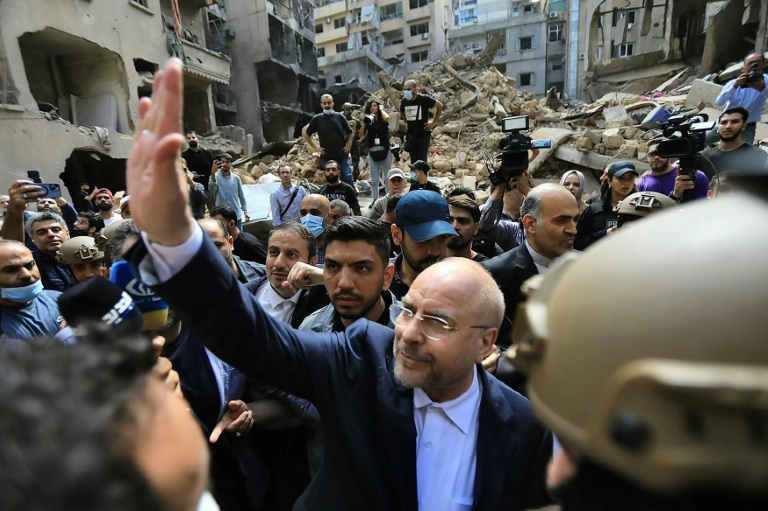Iran’s parliament speaker, Mohammad Bagher Ghalibaf, visited the site of deadly Israeli strikes in central Beirut and denounced Israel’s “crimes”. The strikes targeted the Iran-backed Lebanese group Hezbollah’s security chief, Wafiq Safa, leading to at least 22 deaths. Ghalibaf criticized the international community for remaining silent on Israel’s actions, emphasizing the need for intervention from organizations such as the UN Security Council. He met with Lebanese Prime Minister Najib Mikati to discuss working towards a ceasefire, with Mikati calling for immediate action from the United Nations to end the violence.
During his visit, Ghalibaf also met with Hezbollah ally Nabih Berri, pledging Iran’s support for the Lebanese government, people, and Hezbollah during this period of escalation. Both Ghalibaf and Iran’s Foreign Minister Abbas Araghchi, who visited Lebanon the previous week, expressed support for a simultaneous ceasefire with Israel in both Gaza and Lebanon. The goal is to bring an end to the violence and restore peace in the region through diplomatic efforts and international cooperation. Ghalibaf’s visit to Geneva to participate in the Inter-Parliamentary Union highlights Iran’s commitment to engaging with the global community on matters of peace and stability.
The recent Israeli strikes in Beirut have escalated tensions in the region, prompting condemnation from Iran and support for Lebanon’s efforts to achieve a ceasefire. Iran’s involvement in advocating for peace reflects its strategic interests in the Middle East and its support for Hezbollah as a key ally in the region. The visit by Ghalibaf, a prominent figure in Iran’s government, underscores the importance of diplomatic initiatives in resolving conflicts and preventing further violence. By engaging with Lebanese leaders and showing solidarity with Hezbollah, Iran aims to play a constructive role in addressing the crisis and promoting stability.
The situation in Lebanon remains precarious as violence continues to erupt between Israel and Hezbollah, leading to civilian casualties and destruction. The calls for a ceasefire from Lebanon’s government and Iran demonstrate a commitment to de-escalating the conflict and preventing further bloodshed. The international community, particularly the UN Security Council, is urged to take decisive action to halt Israel’s military operations and facilitate a peaceful resolution to the crisis. Ghalibaf’s visit to the site of the deadly strikes serves as a powerful symbol of solidarity with the Lebanese people and condemnation of Israel’s actions, highlighting the urgent need for intervention and diplomacy.
As Iran’s parliament speaker, Ghalibaf plays a significant role in shaping the country’s foreign policy and engaging with regional allies to address security challenges. By visiting Beirut and expressing support for Lebanon and Hezbollah, Iran seeks to consolidate its influence in the region and demonstrate its commitment to upholding the rights of oppressed populations. The diplomatic efforts spearheaded by Iran, alongside other actors in the region, aim to prevent further escalation of violence and pave the way for a peaceful resolution to the conflict. Ghalibaf’s participation in international forums such as the Inter-Parliamentary Union underscores Iran’s determination to advocate for peace and stability on the global stage, despite ongoing conflicts in the Middle East.
In conclusion, Iran’s condemnation of Israel’s “crimes” in Lebanon reflects the complex dynamics of the regional conflict and the competing interests of key players in the Middle East. Ghalibaf’s visit to Beirut and subsequent engagements with Lebanese officials underscore the importance of diplomatic initiatives in resolving the crisis and preventing further bloodshed. The calls for a ceasefire from both Iran and Lebanon highlight the urgent need for international intervention to address the escalating violence and restore peace in the region. By participating in multilateral forums and advocating for diplomatic solutions, Iran seeks to play a constructive role in de-escalating tensions and promoting stability in the Middle East.


